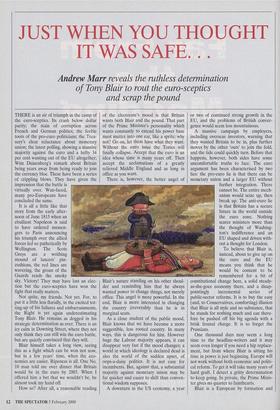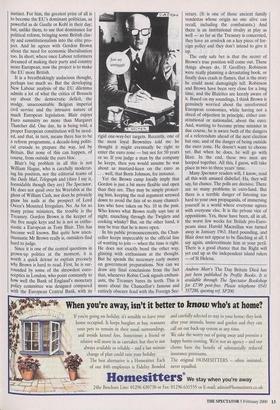JUST WHEN YOU THOUGHT IT WAS SAFE...
Andrew Marr reveals the ruthless determination
of Tony Blair to rout the euro-sceptics and scrap the pound
THERE is an air of triumph in the camp of the euro-sceptics. Its crash below dollar parity; the stain of corruption across French and German politics; the feeble toots of the pro-euro politicians; the Trea- sury's clear reluctance about monetary union; the latest polling, showing a massive majority against the euro and a hefty 34 per cent wanting out of the EU altogether; Wim Duisenberg's remark about Britain being years away from being ready to join the currency bloc. These have been a series of crippling blows. They have given the impression that the battle is virtually over. Wan-faced, many pro-Europeans have concluded the same.
It is all a little like that story from the early after- noon of June 1815 when an ebullient Napoleon is said to have ordered messen- gers to Paris announcing his triumph over the allied forces led so pathetically by Wellington. The Scots Greys are a writhing mound of lancers' pin- cushions, the red lines are wavering, the groan of the Guards rends the smoky sky. Victory! They may have lost an elec- tion but the euro-sceptics have won the tight that really matters.
Not quite, my friends. Not yet. For, to put it a little less floridly, in the excited tot- ting-up of his failures and embarrassments, the Right is yet again underestimating Tony Blair. He remains as dogged in his strategic determination as ever. There is an icy calm in Downing Street, where they not only think they can still win the euro battle, but are quietly convinced that they will.
Blair himself takes a long view, seeing this as a fight which can be won not now, but in a few years' time, when the eco- nomics are easier. Ripeness is all. One No. 10 man told me over dinner that Britain would be in the euro by 2003. When I offered him a bet that we wouldn't be, he almost took my hand off.
How so? After all, a reasonable reading of the electorate's mood is that Britain wants both Blair and the pound. That part of the Prime Minister's personality which wants constantly to extend his power base must mutter into one ear, like a sprite: why not? Go on, let them have what they want. Without the euro issue the Tories will finally collapse. Accept that the euro is an idea whose time is many years off. Then accept the acclamations of a greatly relieved Middle England and as long in office as you want.
There is, however, the better angel of Blair's nature standing on his other shoul- der and reminding him that he always wanted power to change things, not merely office. This angel is more powerful. In the end, Blair is more interested in changing the country irreversibly than he is in marginal seats.
As a close student of the public mood, Blair knows that we have become a more suggestible, less rooted country. In many ways, this is dangerous for him. However huge the Labour majority appears, it can disappear very fast if the mood changes; a world in which ideology is declared dead is also the world of the sudden upset, of oops-a-daisy politics. It is not easy for incumbents. But, against that, a substantial majority against monetary union may be far quicker and easier to shift than conven- tional wisdom supposes.
A downturn in the US economy, a year or two of continued strong growth in the EU, and the problems of British conver- gence would seem less mountainous.
To believe that Blair is, instead, about to give up on the euro and the EU means you think that he would be content to be remembered for a bit of constitutional change here, a solid steady- as-she-goes economy there, and a disap- pointingly incremental series of public-sector reforms. It is to buy the easy (and, to Conservatives, comforting) illusion that Blair is all style and no substance, that he stands for nothing much and can there- fore be pushed off his big agenda with a brisk frontal charge. It is to forget the Prussians.
One thousand days may seem a long time to the headline-writers and it may seem even longer if you need a hip replace- ment, but from where Blair is sitting his time in power is just beginning. Europe will not work without both economic and politi- cal reform. To get it will take many years of hard graft. I detect a gritty determination to keep going. In private, the Prime Minis- ter gives no quarter to fainthearts.
Blair is a European by formation and instinct. For him, the greatest prize of all is to become the EU's dominant politician, as powerful as de Gaulle or Kohl in their day; but, unlike them, to use that dominance for political reform, bringing some British clar- ity and constitutionalism into the elite pro- ject. And he agrees with Gordon Brown about the need for economic liberalisation too. In short, where once Labour reformers dreamed of making their party and country more European, now the project is to make the EU more British.
It is a breathtakingly audacious thought, perhaps too much so. But the developing New Labour analysis of the EU dilemma admits a lot of what the critics of Brussels say about the democratic deficit, the stodgy, unaccountable Belgian imperial civil service and the intrusive nature of much European legislation. Blair enjoys Euro summitry no more than Margaret Thatcher did. One day, he is being told, a proper European constitution will be need- ed, and that, in turn, means there has to be a reform programme, a decade-long politi- cal crusade to prepare the way, led by Britain. But none of this can happen, of course, from outside the euro bloc.
Blair's big problem in all this is not William Hague, who is carefully moderat- ing his position, nor the editorial teams of the Daily Mail, Telegraph and (dare I say it, formidable though they are) The Spectator. He does not quail over his Weetabbc at the ghost of William Cash, nor does he privately gnaw his nails at the prospect of Lord Ovven's Mounted Irregulars. No. As for so many prime ministers, the trouble is the Treasury. Gordon Brown is the keeper of the five magic keys and he is not as enthu- siastic a European as Tony Blair. This has become well known. But quite how unen- thusiastic Mr Brown really is, outsiders find hard to judge.
Since it is one of the central questions in grown-up politics at the moment, it is worth a quick detour to explain precisely why Brown is hard to read. First, he is sur- rounded by some of the shrewdest euro- sceptics in London, who point constantly to how well the Bank of England's monetary Policy committee was designed compared With the European Central Bank, with its rigid one-way-bet targets. Recently, one of the most loyal Brownites told me he thought it might eventually be right to enter the euro zone — but not for 50 years or so. If you judge a man by the company he keeps, then you would assume he was about as mustard-keen on the euro as . . . well, that Boris Johnson, for instance.
Yet the Brown camp loyally imply that Gordon is just a bit more flexible and open than they are. They may be simply protect- Mg him, keeping the real argument screwed down to avoid the fate of so many chancel- lors who have taken on No. 10 in the past. Who knows what Brown really says late at night, munching through the Twiglets and cooking whisky? But, on the other hand, it may be true that he is more open.
In his public pronouncements, the Chan- cellor keeps impeccably to the official line of wanting to join — when the time is right. He does not exactly bend the other way, glinting with enthusiasm at the thought. But he spends the necessary early money on government preparations. Nor can we draw any final conclusions from the fact that, whenever Robin Cook signals enthusi- asm, the Treasury bares its teeth. This is more about the Chancellor's famous and entirely obscure feud with the Foreign Sec- retary. (It is one of those ancient family vendettas whose origin no one alive can recall, including the combatants.) And there is an institutional rivalry at play as well — so far as the Treasury is concerned, they have an armlock on a key piece of for- eign policy and they don't intend to give it up.
The only safe bet is that the secret of Brown's true position will come out. These things always do. If Geoffrey Robinson were really planning a devastating book, or finally does crash in flames, that is the story he could most damagingly • tell. Robinson and Brown have been very close for a long time, and the Blairites are keenly aware of it. Based on my soundings, I think Brown is genuinely worried about the unreformed European economies, while having not a shred of objection in principle, either con- stitutional or nationalist, about the euro. And, wanting to become prime minister in due course, he is aware both of the dangers of a referendum ahead of the next election but one, and of the danger of being outside the euro zone. He doesn't want to choose yet. But when he does, he will go with Blair. In the end, these two men are hooped together. All this, I guess, will take place in two to three years' time.
Many Spectator readers will, I know, read all this with amused disbelief. Ha, they will say, fat chance. The polls are decisive. There are so many problems in euro-land. But there is a terrible danger of listening too hard to your own propaganda, of immersing yourself in a world where everyone agrees with everyone else. It is the private vice of oppositions. Yes, these have been, all in all, the worst few weeks for British pro-Euro- peans since Harold Macmillan was turned away in January 1963. Hard pounding, and Blair does not appear to be flinching at all. I say again, underestimate him at your peril. There is a good chance that the Right will yet end up as the independent island rulers — of St Helena.
Andrew Mart's The Day Britain Died has just been published by Profile Books. It is available through The Spectator Bookshop for f7.99 post-free. Please telephone 0541 557288, quoting ref SP200.



























































 Previous page
Previous page